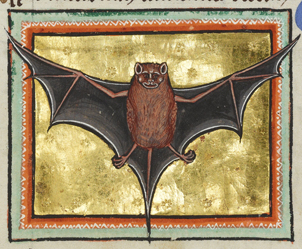Arzneimittel Vespertilio
Zur Fledermaus in der mittelalterlichen Buchmalerei, insbesondere in den italienischen Tractatus de Herbis-Handschriften
Identifier (Artikel)
Abstract
In contrast to other cultures, European Christian civilization tendsto have negative emotions towards the bat, which is now suspectedof having caused the Coronavirus pandemic as a virus carrier. Thisbat has unusual properties, which have been noticed by naturalistssince ancient times: It is the only flying mammal, no other animallives in such large groups so close together, and it navigates in thedark. Although its negative interpretation in Christianity is rootedin the Bible, it is only from ca. 1280 that it appears in art oftenentangled with devils and demons. The current article focuses ontexts and images, especially in book illumination, in which a positiveor neutral view of the animal can be found. Of particular interest isthe bat in pharmacopoeia and its appearance in Italian herbaria ofthe fourteenth century.
Statistiken


Lizenz

Dieses Werk steht unter der Lizenz Creative Commons Namensnennung - Nicht-kommerziell - Keine Bearbeitungen 4.0 International.


